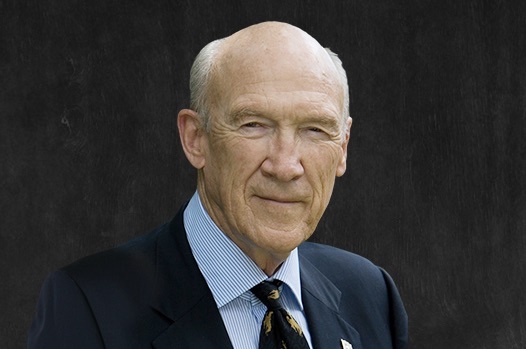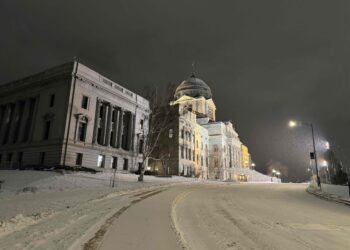By Todd Wilkinson EBS Environmental Columnist
The first time I gawked upward from the floor of the U.S. Capitol Rotunda, toward beams of light pouring in through its dome, experiencing sensations of awe that were also present upon visits to the Sistine Chapel, Cathedral of Notre Dame and Westminster Abbey, I had the fortune of being led around by a personal tour guide.
That chaperon spoke quietly out of reverence. He gestured with long arms, describing in detail the history of Americans memorialized in statuary and narratives of priceless paintings chronicling the birth of a country. He ticked off a list of those who had walked the cavernous hallowed halls connecting both houses of Congress.
Steeped in knowledge, he held forth with giddy delight.
For him it was an honor and a sacred privilege to not only be learned about the place where he worked and carried out the nation’s business. He carried the spirit of the Capitol in his heart as a place that he believed was inviolate—that no American in his or her right mind would ever dare to dishonor by acting like drunken hooligans driven to atrocity.
The guide on that day exactly 30 years ago this winter was U.S. Sen. Alan K. Simpson of Wyoming, who then was Minority Whip of the Republican Party serving in the most powerful legislative body in the world. Up Pennsylvania Avenue in the White House was a president and first lady who considered Al and Ann Simpson dearest of friends. So close were the senator and George H. W. Bush that the former was asked by the latter to deliver his eulogy.
It was at President Bush’s funeral in December 2018 that Simpson shared a kind of proverb once told to him by his mother and seemingly perfectly suited for these times. “Hate,” Simpson said, speaking of toxic partisanship and cultural tribalism, “corrodes the container it is carried in.”
I didn’t know what Sen. Simpson was thinking while, at home in Cody, Wyoming last week, he saw the same images on television we did—of the Capitol being overrun by a mob of invaders abusing the term “patriots.”
The sackers brutally beat a Capitol police officer to death with a fire extinguisher, broke down doors and invaded the House and Senate chambers carrying zip ties ostensibly to take members of Congress hostage, or worse. Some had Molotov cocktails, others pulled down their pants and squatted, smearing the walls of the citadel of American democracy with feces while others chanted en masse: “Hang Mike Pence.”
None of this would have ever happened were it not for a person who served as a direct or indirect catalyst.
As I said, I wondered what Simpson had made of the unprecedented act of extremism.
“What did I feel?” he asked after I called him. “Sadness, deep innate sadness.”
Simpson’s Senate Whip Office was located right off the Rotunda. Over the years, he had become friends with Capitol cops who guarded the safety of elected officials and the chefs who cooked meals, and the waiters and the cleaning staff. “It’s as it is in Wyoming. Nobody is above anybody else. You meet people. You get to know them. You learn about their lives.”
At 89, having served three terms in the U.S. Senate and 12 years in the Wyoming House of Representatives, having made deep friendship with colleagues on both sides of the political aisle, including the late Ted Kennedy and president-elect Joe Biden with whom he served together on the Senate Judiciary Committee, he describes the events of Jan. 6, 2021.
“My response is not so much revulsion but thinking of it as terrible, just terrible,” Simpson said. “There was clammy sadness that something like this could even happen. Members [of Congress] and their staffs hunkered down worried that someone might do them violent harm.”
After he came to Washington, D.C. in the late 1970s, Simpson was given advice by Sen. Jacob Javits, a Republican from New York. “He said coming from Wyoming you’re somewhat of an insular person, but you’re a bright guy with an interesting background so get to know your colleagues and their spouses; travel with them.” Simpson cultivated lasting friendships and if disagreements arose, they didn’t have to become personal.
People, he said, don’t want to hurt other people they get to know.
Yes, Simpson is a fiscal conservative who obviously often disagrees with the tactics and rhetoric of the left.
But he’s equally dismayed by the disintegration of what the GOP used to be. “Part of the Republican Party is heading toward cultism and there are various kinds,” he said. “There’s the homophobe cult, the abortion cult, the conspiracy cult and the no-mask cult. There’s the follow-law-and-order cult and the get-government-out-of-your-life-and-leave-me-alone cult. The madness of the event [at the Capitol] should pull anyone out of their quandary.”
Simpson has no tolerance for “insurrectionist” politicians or citizens.
“You have to remember that these people were lied to, over and over again,” he said. He lauds Sen. Mitt Romney for saying, “The best way we could show respect for the voters who were upset is by telling them the truth. That’s the burden. That’s the duty of leadership.”
Despite hurt feelings that have festered across the aisle for years, societal change starts with individual decisions. Politicians need to halt the continuous cycle of recrimination. They need to have the courage, he said, to stand before their constituents and beseech them to let their hostilities go.
Todd Wilkinson is the founder of Bozeman-based Mountain Journal and is a correspondent for National Geographic. He’s also the author of the book “Grizzlies of Pilgrim Creek,” featuring photography by Thomas D. Mangelsen, about famous Jackson Hole grizzly bear 399.












